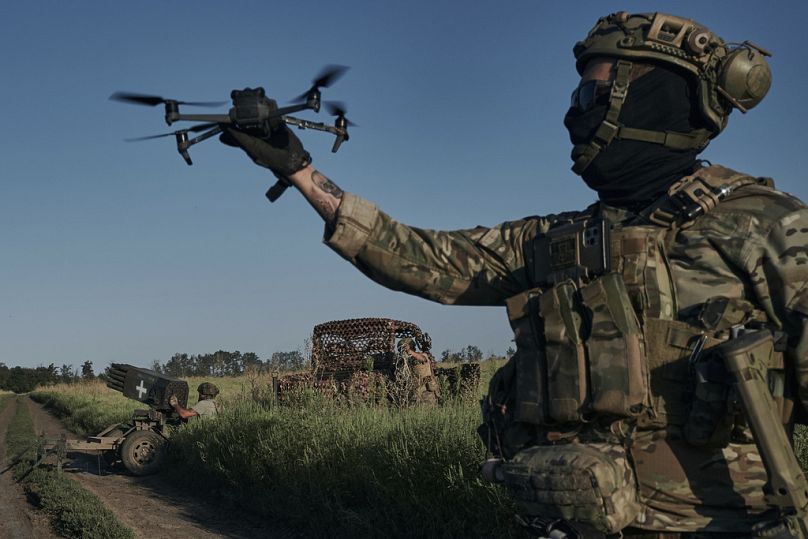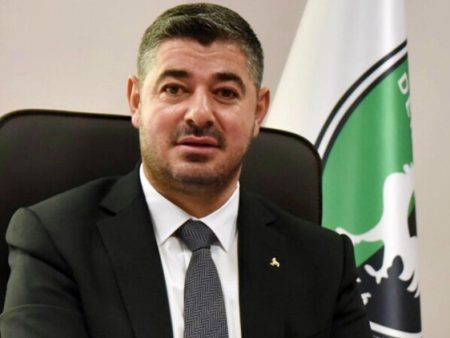Why does Ukraine keep launching drones into the heart of Russia, when they rarely hit strategic targets or cause significant damage?
What’s the point in Kyiv’s drone war against Russia?
It’s almost a daily occurrence now.
Against the backdrop of its gritty counteroffensive, Kyiv is firing drone after drone deep inside Russian territory, targeting Moscow especially.
Yet, bar some exceptions, most strikes lack a clear military objective and almost always cause no casualties or damage – especially when they are often intercepted by Russian air defences.
So what then is the purpose of Ukraine’s drone war against Russia?
A key element is psychological warfare, with Kyiv trying to damage highly symbolic Russian targets, says Peter Lee, a drone expert at the University of Portsmouth.
“Ukraine is much less powerful than Russia because of its size,” he explains. “Especially when you are up against a much bigger enemy, drones allow you to target your enemy’s capital.”
“That, for centuries, has been known to have a psychological effect.”
An alleged drone strike spectacularly hit the Kremlin in May, which it initially called an assassination attempt against Russian President Vladimir Putin, though some analysts called this an inside job aimed at putting the Russian population on more of a war footing.
“Back in Ukraine, such attacks boost the morale of an army and population that are suffering terribly,” continues Lee. “It’s a small indication of offensive power, but it shows they are able to hit back.”
The same goes for Russia, just in the opposite way.
“There is a psychological effect in taking the war to Russia’s homeland,” says Marina Miron, a post-doctoral researcher at King’s College War Studies Department. “The Ukrainians want to show the weakness of Russian air defences and that the regime is unable to protect its citizens in the very heart of Russia.”
She points to the spate of attacks in July on the Moscow City building – an “economic symbol” – while Putin was meeting African leaders in St. Petersburg.
Fueling insecurity in Russia has bee speculation – now confirmed by Ukrainian officials – that drones are launched from Russian territory.
Though some models are hard to intercept, Lee highlights the “technical limits” of smaller drones, which can have a range of as little as 65km, and the fact that targets deep inside the country have been hit.
“That means either there are Russians within Russia who are sympathetic to the Ukrainian cause or Kyiv is sending teams to Russia. Either way, the Kremlin is not going to give it much publicity,” he adds.
‘An eye for an eye’
Still, there are risks Kyiv’s strategy could backfire.
Since its February 2022 invasion, Russia has been repeatedly accused of “terror bombing” Ukrainian civilians in a bid to break their will.
Though she could understand the emotional desire to strike back, Miron feared Kyiv’s drone attacks could damage its reputation if Russian civilians were killed.
“I can see why Ukranians want Russia to feel how it feels to wake up in the morning from the sirens of air defences, hiding in cellars, waiting and hoping a missile barrage won’t kill you… But they risk losing the moral high ground.”
Kyiv has been using drones “just to inculcate fear,” she continues. “Strictly speaking, conceptually, it could be classified as terrorism.”
Russian President Vladimir Putin has long denounced Kyiv as a malevolent, criminal state, calling its drone strikes a “clear sign of terrorist activity” in May.
“These attacks are very beneficial for Russia to justify what it is doing in Ukraine,” explained Miron, suggesting they could boost popular support for the war and draw people closer to the Kremlin. “They’re actually counterproductive.”
Another objective of Kyiv’s drone strike is degrading Russia’s military capability.
“Ukraine doesn’t have the same airpower as Russia does. What they are trying to achieve with the drone war is some kind of parity,” says Miron, noting how drones are far more cost-effective than missiles.
In August, four military aircraft were destroyed in “one of the biggest” Ukrainian drone strikes against Russia since the fighting, while an air strike by Kyiv took out 10 warplanes in Crimea last year – which Ukraine initially blamed on a Russian soldier’s discarded cigarette.
‘Drones aren’t a war-winning weapon’
Despite the media splash they make, Miron cautioned against overstating the military effectiveness of Kyiv’s strikes.
“We don’t know how many have failed. We only hear about the successes. From a purely military perspective they not going to make much of a difference,” she says.
“That said Ukraine gets plus points by showing it worth investing in. The Ukrainians… need to demonstrate they are worthy of Western investment.”
It is unknown how many Ukrainian drones have hit Russia, with information closely guarded by both sides. BBC Verify recently found there have been more than 190 suspected attacks this year in Russia and the annexed Crimean peninsula.

Some suggest Kyiv’s drone war is designed to distract from a supposedly faltering counteroffensive.
Yet, expert Lee pushed back against this, saying drones instead played a part in the attritional struggle facing Ukraine.
“Nobody with any common sense would expect a quick result. War is not a Hollywood movie. It’s ugly and difficult and costly and brutal,” he tells Euronews.
“Even if the offensive was going very well, those drone strikes will still take place. The two things are not mutually exclusive.”
Russia had many months to prepare for Ukraine’s assault, digging trenches and laying extensive minefields. Overcoming this inevitably costs Kyiv time – and lives.
Stretching Moscow’s resources is a secondary military objective of the drone campaign, suggests Lee.
Faced with Kyiv’s attacks, the Russian leadership must decide whether to deploy its finite defences to defend Moscow or soldiers on the ground, he explains.
“Anything that can reduce or disrupt resources going to the frontline, whether that’s people or weapons, is valuable. ”
The gruelling guerilla campaign of Islamist rebels against the USSR in Afghanistan during the 80s put huge financial strain on Moscow, eventually forcing its forces to pull out and helping bring about the end of the Soviet Union.
Again there are risks.
“European countries and the United States do not want this conflict to escalate. If Kyiv keeps attacking Russian targets increasingly aggressively. Then Ukraine might find itself losing backers in the West,” says Lee.
“It’s all fine lines and fine judgments.”







